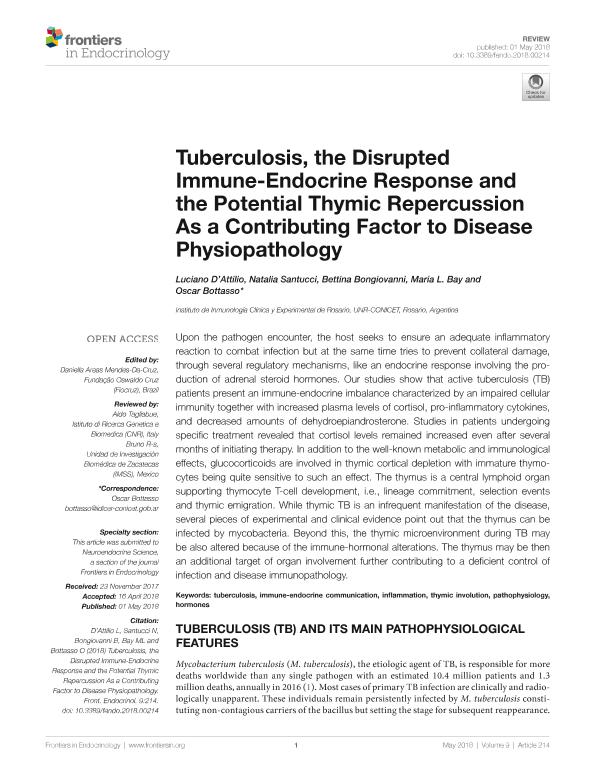Mostrar el registro sencillo del ítem
dc.contributor.author
D'attilio, Luciano David

dc.contributor.author
Santucci, Natalia Estefanía

dc.contributor.author
Bongiovanni, Bettina

dc.contributor.author
Bay, Maria Luisa

dc.contributor.author
Bottasso, Oscar Adelmo

dc.date.available
2019-12-10T19:42:44Z
dc.date.issued
2018-05
dc.identifier.citation
D'attilio, Luciano David; Santucci, Natalia Estefanía; Bongiovanni, Bettina; Bay, Maria Luisa; Bottasso, Oscar Adelmo; Tuberculosis, the disrupted immune-endocrine response and the potential thymic repercussion as a contributing factor to disease physiopathology; Frontiers Research Foundation; Frontiers in Endocrinology; 9; MAY; 5-2018; 1-9
dc.identifier.issn
1664-2392
dc.identifier.uri
http://hdl.handle.net/11336/91962
dc.description.abstract
Upon the pathogen encounter, the host seeks to ensure an adequate inflammatory reaction to combat infection but at the same time tries to prevent collateral damage, through several regulatory mechanisms, like an endocrine response involving the production of adrenal steroid hormones. Our studies show that active tuberculosis (TB) patients present an immune-endocrine imbalance characterized by an impaired cellular immunity together with increased plasma levels of cortisol, pro-inflammatory cytokines, and decreased amounts of dehydroepiandrosterone. Studies in patients undergoing specific treatment revealed that cortisol levels remained increased even after several months of initiating therapy. In addition to the well-known metabolic and immunological effects, glucocorticoids are involved in thymic cortical depletion with immature thymocytes being quite sensitive to such an effect. The thymus is a central lymphoid organ supporting thymocyte T-cell development, i.e., lineage commitment, selection events and thymic emigration. While thymic TB is an infrequent manifestation of the disease, several pieces of experimental and clinical evidence point out that the thymus can be infected by mycobacteria. Beyond this, the thymic microenvironment during TB may be also altered because of the immune-hormonal alterations. The thymus may be then an additional target of organ involvement further contributing to a deficient control of infection and disease immunopathology.
dc.format
application/pdf
dc.language.iso
eng
dc.publisher
Frontiers Research Foundation

dc.rights
info:eu-repo/semantics/openAccess
dc.rights.uri
https://creativecommons.org/licenses/by/2.5/ar/
dc.subject
HORMONES
dc.subject
IMMUNE-ENDOCRINE COMMUNICATION
dc.subject
INFLAMMATION
dc.subject
PATHOPHYSIOLOGY
dc.subject
THYMIC INVOLUTION
dc.subject
TUBERCULOSIS
dc.subject.classification
Inmunología

dc.subject.classification
Medicina Básica

dc.subject.classification
CIENCIAS MÉDICAS Y DE LA SALUD

dc.subject.classification
Enfermedades Infecciosas

dc.subject.classification
Ciencias de la Salud

dc.subject.classification
CIENCIAS MÉDICAS Y DE LA SALUD

dc.title
Tuberculosis, the disrupted immune-endocrine response and the potential thymic repercussion as a contributing factor to disease physiopathology
dc.type
info:eu-repo/semantics/article
dc.type
info:ar-repo/semantics/artículo
dc.type
info:eu-repo/semantics/publishedVersion
dc.date.updated
2019-10-18T19:13:46Z
dc.journal.volume
9
dc.journal.number
MAY
dc.journal.pagination
1-9
dc.journal.pais
Suiza

dc.description.fil
Fil: D'attilio, Luciano David. Consejo Nacional de Investigaciones Científicas y Técnicas. Centro Científico Tecnológico Conicet - Rosario. Instituto de Inmunología Clinica y Experimental de Rosario. Universidad Nacional de Rosario. Facultad de Ciencias Médicas. Instituto de Inmunología Clinica y Experimental de Rosario; Argentina
dc.description.fil
Fil: Santucci, Natalia Estefanía. Consejo Nacional de Investigaciones Científicas y Técnicas. Centro Científico Tecnológico Conicet - Rosario. Instituto de Inmunología Clinica y Experimental de Rosario. Universidad Nacional de Rosario. Facultad de Ciencias Médicas. Instituto de Inmunología Clinica y Experimental de Rosario; Argentina
dc.description.fil
Fil: Bongiovanni, Bettina. Consejo Nacional de Investigaciones Científicas y Técnicas. Centro Científico Tecnológico Conicet - Rosario. Instituto de Inmunología Clinica y Experimental de Rosario. Universidad Nacional de Rosario. Facultad de Ciencias Médicas. Instituto de Inmunología Clinica y Experimental de Rosario; Argentina
dc.description.fil
Fil: Bay, Maria Luisa. Consejo Nacional de Investigaciones Científicas y Técnicas. Centro Científico Tecnológico Conicet - Rosario. Instituto de Inmunología Clinica y Experimental de Rosario. Universidad Nacional de Rosario. Facultad de Ciencias Médicas. Instituto de Inmunología Clinica y Experimental de Rosario; Argentina
dc.description.fil
Fil: Bottasso, Oscar Adelmo. Consejo Nacional de Investigaciones Científicas y Técnicas. Centro Científico Tecnológico Conicet - Rosario. Instituto de Inmunología Clinica y Experimental de Rosario. Universidad Nacional de Rosario. Facultad de Ciencias Médicas. Instituto de Inmunología Clinica y Experimental de Rosario; Argentina
dc.journal.title
Frontiers in Endocrinology
dc.relation.alternativeid
info:eu-repo/semantics/altIdentifier/url/http://journal.frontiersin.org/article/10.3389/fendo.2018.00214/full
dc.relation.alternativeid
info:eu-repo/semantics/altIdentifier/doi/http://dx.doi.org/10.3389/fendo.2018.00214
Archivos asociados
